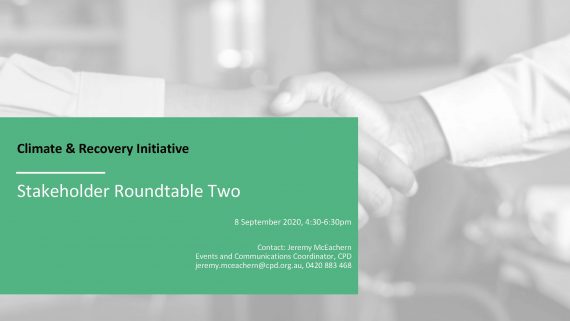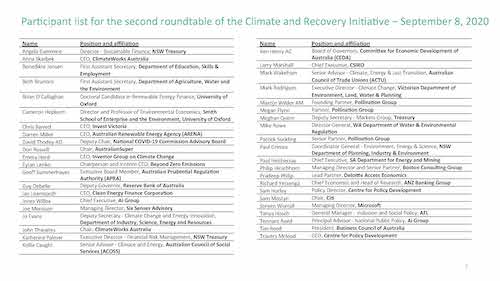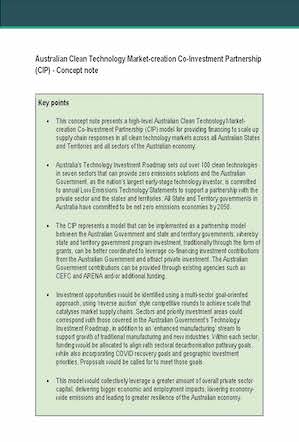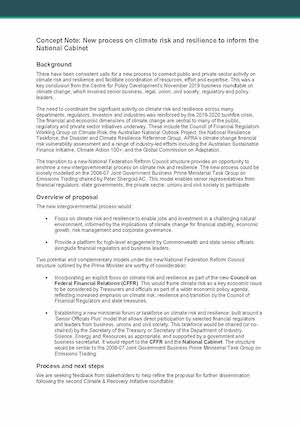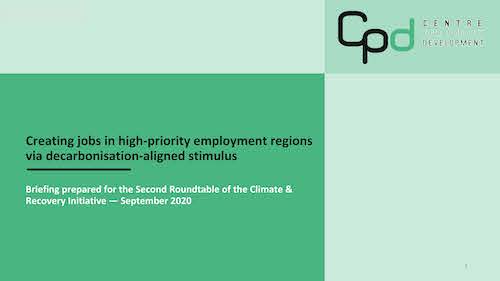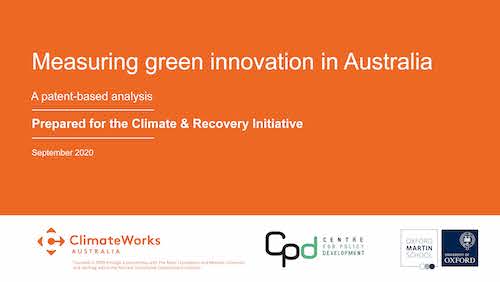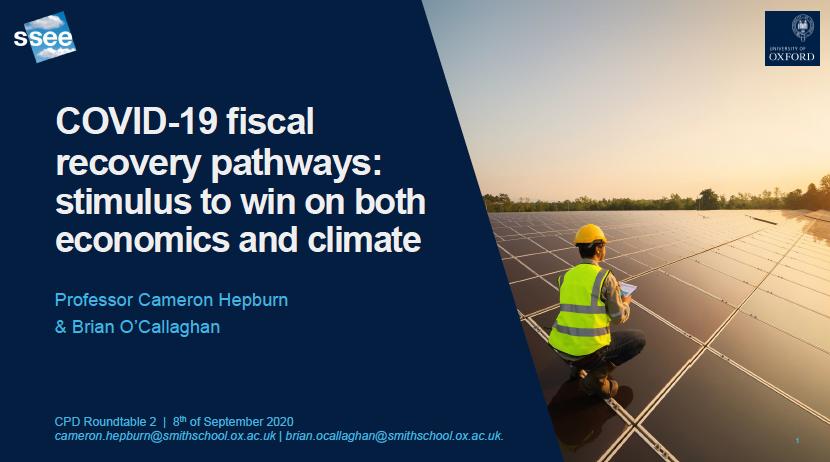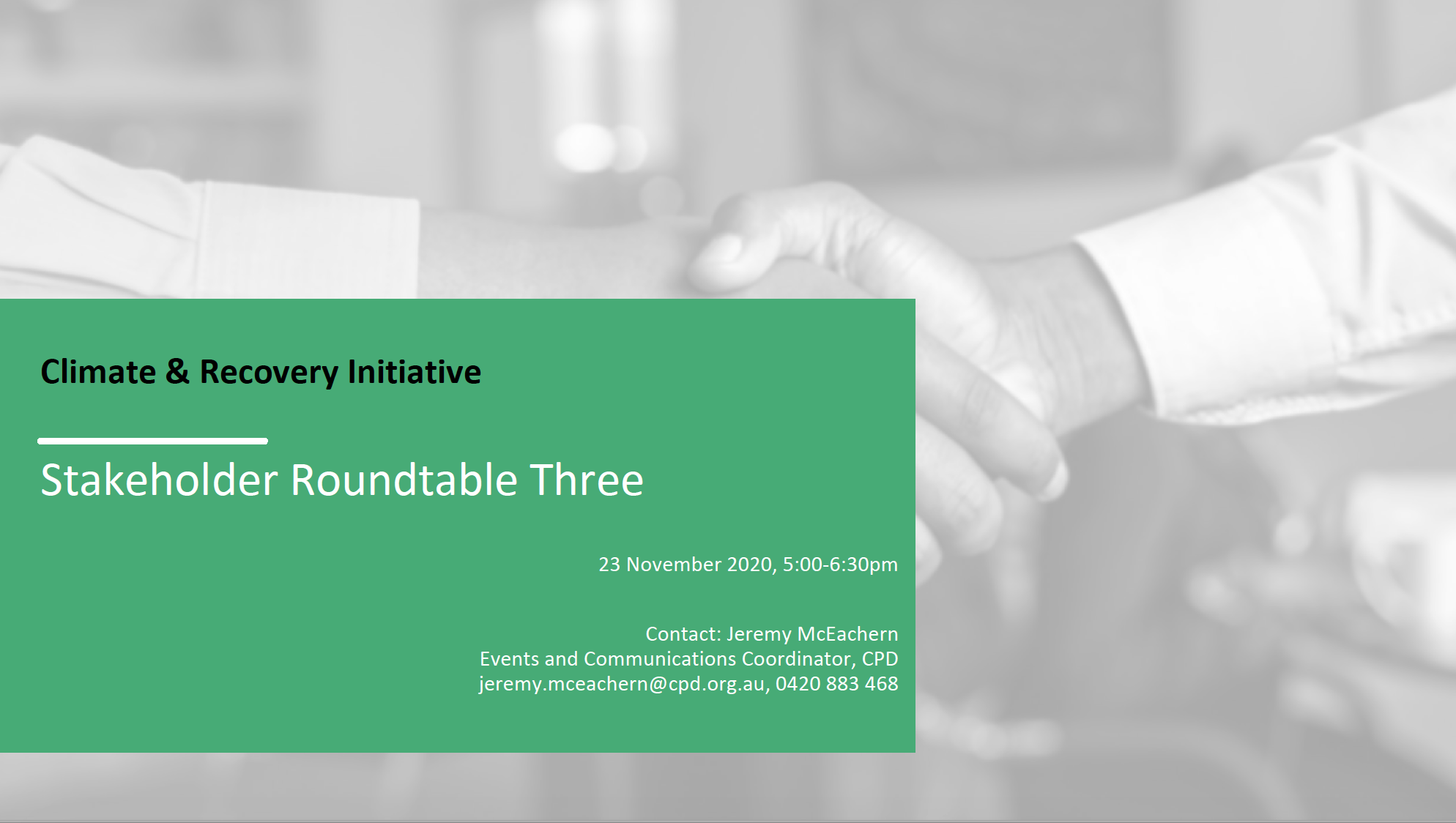CPD in partnership with ClimateWorks, Ai Group, ACTU and Pollination
The Climate and Recovery Initiative brings together prominent leaders from government, business and civil society to identify the best ideas for aligning Australia’s economic recovery with a transition towards a net zero emissions economy, and to get them into the right hands.
The Initiative is coordinated by the Centre for Policy Development (CPD) and ClimateWorks Australia, with a steering group that includes the Australian Industry Group (Ai Group), the Australian Council of Trade Unions (ACTU), and Pollination.
Working together since May 2020, the group has hosted three large stakeholder roundtables, convening senior officials from the Commonwealth and state governments alongside leaders from industry, unions, community organisations, think tanks and academia. Participants include representatives from the Business Council of Australia, AiGroup, ACTU, the Investor Group on Climate Change, the Australian Council of Social Services, the Reserve Bank of Australia, and the Australian Prudential Regulation Authority (APRA).
The Initiative was formed in recognition that Australia faces two generation-defining challenges: recovering from the coronavirus pandemic and responding to climate change. These challenges are intertwined. Investments in climate resilience and net zero ambition today can turbocharge Australia’s recovery and position the country for stronger and more sustainable economic growth in the years ahead. The group is focused on both job-creating stimulus opportunities and broader policy changes that could sustain national collaboration on systemic risks like climate change.
At the first roundtable on 25 June 2020, participants shared frank insights and discussed opportunities to better align Australia’s economic recovery with climate and transition priorities. The discussion centred on three priority areas:
- Identifying crisis response measures that can support jobs and growth now while aligning with a transition to a low emissions economy.
- Entrenching ‘net zero’ in the wider policy agenda, making climate risk and resilience central to economic policymaking while planning the energy transition to protect the livelihoods of workers and communities.
- Building new processes and models for more coordinated and ambitious climate responses, ensuring a long-term legacy from the current crisis.
The agenda and participant list from the first roundtable are available below, along with a framing paper prepared for the discussion.
At the second roundtable on 8 September 2020, participants discussed policy proposals including new processes on climate risk and resilience to inform the National Cabinet and an Australian Clean Technology Market-Creation Co-Investment Partnership. The proposals received encouraging support from a range of participants. Further detail on these proposals is available below, along with the agenda and participant list from the second roundtable.
Two research papers developed to inform the second roundtable are also available below. The first identifies opportunities to create decarbonisation-aligned jobs in employment regions that have been doubly disadvantaged by long-term high unemployment and worse-than-average impacts from COVID-19. The second analyses global green technology patent activity, finding that Australia performs well among global peers in green innovation.
The Climate and Recovery Initiative will continue for the remainder of 2020 and into 2021, with key windows including the formation of the 2021-22 Federal Budget and the lead up to COP26 in November 2021.
Please note that the attached documents were prepared by the roundtable organisers and do not necessarily reflect the views of the individuals or organisations present at the roundtable.
Materials from Roundtable One, 25 June 2020
- Roundtable one pack including agenda and framing paper
- Roundtable one participant list
- Roundtable one framing paper
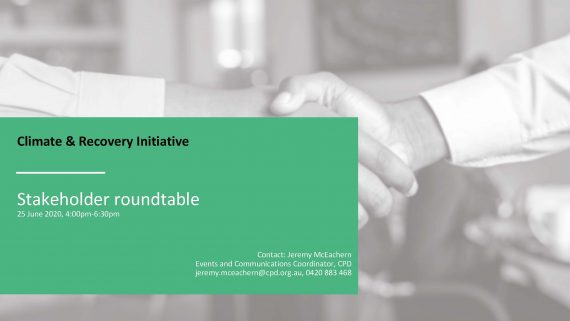 |
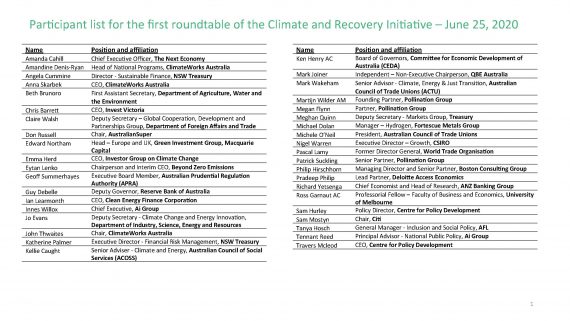 |
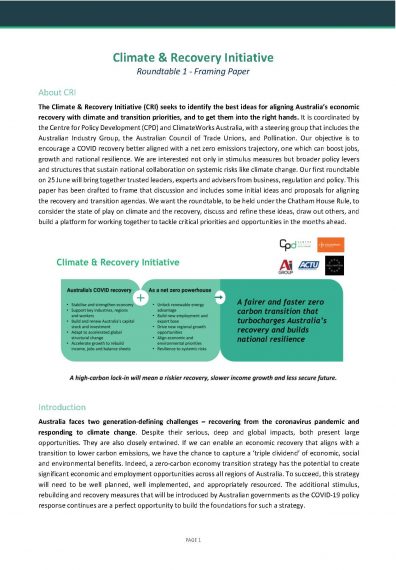 |
||
| Roundtable One: Pack (agenda and framing paper) |
Roundtable One: Participant List |
Roundtable One: Framing Paper |
Materials from Roundtable Two, 8 September 2020
- Roundtable two pack including agenda and summary of proposals
- Roundtable two participant list
- Proposal: New process on climate risk and resilience to inform the National Cabinet
- Proposal: Australian Clean Technology Market-Creation Co-Investment Partnership
- Analysis: Creating jobs in high-priority employment regions via decarbonisation-aligned stimulus
- Analysis: Measuring green innovation in Australia
- Briefing: COVID-19 fiscal recovery pathways
Proposals for more coordinated and effective climate responses
Participants at the second roundtable discussed two proposed processes on climate risk and resilience that could support better coordination between state and federal governments and the private sector in the new federation structures to replace the Council of Australian Governments. The first model would incorporate an explicit focus on climate risk and resilience as part of the Council of Federal Financial Relations, which reports to the National Cabinet. This would help Treasurers and officials address climate risks and the need to build climate resilience as part of the broader economy policy agenda.
The second would establish a new forum or taskforce on climate risk and resilience, which would include senior government officials, financial regulators, and leaders from business and civil society. The taskforce would advise the government on opportunities to enable sustainable jobs, growth and investment in a challenging natural environment, informed by the implications of climate change for financial stability, risk management and corporate governance.
Participants also discussed a proposed Australian Clean Technology Market-Creation Co-Investment Partnership (CIP). The CIP is a model for providing financing to scale up supply chain responses in clean technology markets across Australia in order to enable decarbonisation across all sectors of the economy. It could be implemented as a partnership between the Commonwealth Government and the state and territory governments, whereby state and territory government program investment, traditionally through the form of grants, could be better coordinated to leverage co-financing investment contributions from the Australian Government and attract private investment.
Investment opportunities would be identified using a multi-sector goal-oriented approach, using ‘reverse auction’ style competitive rounds. This model would collectively leverage a greater amount of private sector capital, delivering bigger economic and employment impacts, lowering economy-wide emissions and leading to greater resilience of the Australian economy.
Materials from Roundtable Three, 23 November 2020
- Roundtable three pack including agenda and summary of proposals
- Read a more detailed account of the roundtable here.
Climate & Recovery Initiative Public Forum, 23 November 2020
- Watch a full recording of the event featuring Geoff Summerhayes, Anna Skarbek and Don Russell by following the link below.
- Read more detailed account of the Public Forum here.
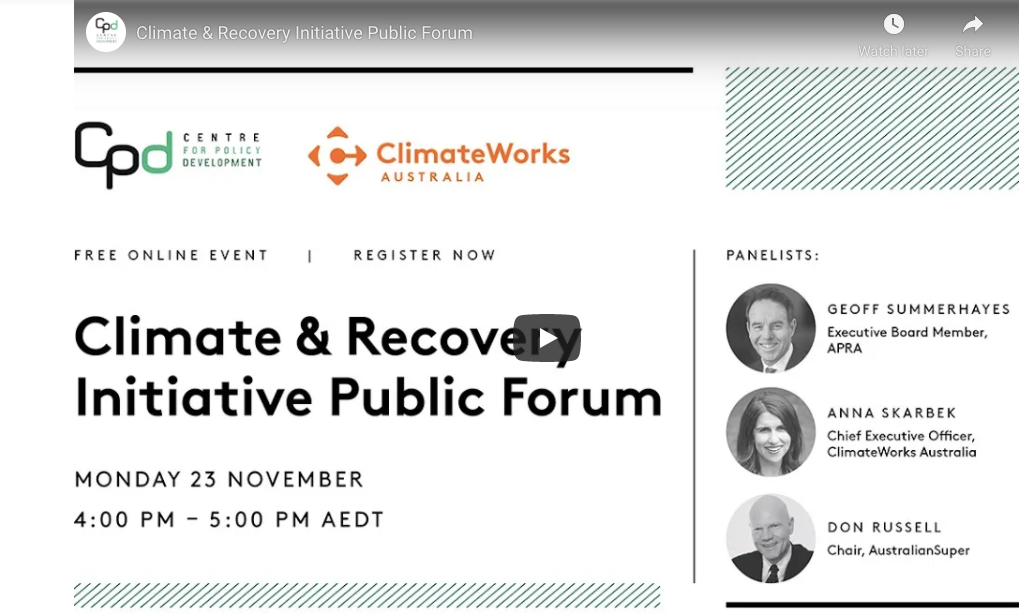 |
| Climate & Recovery Initiative Public Forum |
Support for greater alignment of Australia’s recovery with climate priorities
CPD CEO Travers McLeod said that the Initiative has highlighted broad support for greater alignment of Australia’s recovery and climate priorities and the desire for a more ambitious, coordinated response.
“The seniority and breadth of Climate and Recovery Initiative participants shows there is widespread support for a smart recovery that aligns job creation today with a long-term vision for a thriving, zero carbon Australia. This can create lasting benefits across all Australian regions, including those hardest hit by COVID-19.”
“Like COVID-19, climate change poses risks to every sector of our economy – but it also creates major opportunities. There is a need for a more coordinated response across state and federal governments and in the private and community sectors. The federation reforms under the new National Cabinet should ensure that governments are working together to address climate risks and resilience and building partnerships with industry and communities.”
Travers McLeod
ClimateWorks Australia CEO Anna Skarbek said that aligning Australia’s economic recovery with a trajectory to net zero emissions will require ambition and cross-sector collaboration, which is exactly what the Initiative is about.
“Australia can achieve net zero emissions by 2050. To do so, we must invest in decarbonisation across all sectors of the economy and in all states and territories. Smart investments today can lay the foundation for long-term growth and prosperity.”
“Better coordination of efforts between the Commonwealth, the states and the private sector can drive large-scale investment, job creation and economic growth while lowering economy-wide emissions.”
Anna Skarbek
Pollination Group Senior Partner Patrick Suckling said that investors and the private sector are becoming more aware of the role of capital in building a more resilient and net-zero emissions economy.
“As corporates are increasingly factoring climate risk and opportunity into their operations as core business, so should governments as core economic management. Similarly, shifting the billions required to transition to a net zero emissions, more climate resilient economy requires public and private capital to work together and in new and better ways. It was encouraging to see consensus among the Climate and Recovery Initiative participants on these two fundamental points, to hear agreement on possible pathways forward on both and to feel the strong unanimity that it is not a choice between emissions reductions and growth and jobs. Rather the two can be mutually reinforcing – we all need to make sure they are.”
Patrick Suckling
Australian Industry Group CEO Innes Willox said coordinated State and Federal efforts will support stronger growth and ensure clean economy finance initiatives have greater impact.
“Australia’s growth trend was weak even before the massive slug of the COVID-19 pandemic, and the escalating costs of climate change have become increasingly obvious. Steps to protect our economy and society by managing and reducing climate risks will support stronger growth for decades to come. Many steps will also have an immediate benefit in restoring growth and employment.”
“Keeping climate risks on the radar of economic policy makers makes good sense. So does bringing State and Federal clean economy finance initiatives together to boost their scale and impact. The Federal Government’s strong recent clean technology announcements can achieve even more in partnership with the States.”
Innes Willox
CPD Deputy Chair and Citi Australia Chair Sam Mostyn said the Climate and Recovery Initiative was a unique collaborative effort to help Australia’s response to cascading crises.
“The Climate and Recovery Initiative is all about the best ideas rising to the top to accelerate Australia’s COVID recovery and make huge gains towards a net zero emissions economy at the same time.”
“This initiative uniquely brings together the expert insights and commitment of some of Australia’s leading men and women from sectors and industries key to Australia’s success.”
Sam Mostyn
Business Council of Australia President Tim Reed said our COVID recovery must include addressing the risk and impact of climate change.
“Our recovery must include addressing the risk and impact of climate change, that means big opportunities for investment in clean energy and decarbonising technology.”
Tim Reed
National COVID-19 Commission Deputy Chair and Australian Climate Leaders Coalition Co-Chair David Thodey AO said the proposals could help to streamline efforts on climate across the federation.
“The Climate and Recovery Initiative has put important proposals on the table and the support for them has been encouraging. The proposals would streamline efforts on climate risk and resilience across the federation with a focus on boosting jobs and investment.”
David Thodey AO
Further reading
- Business, unions unveil green nation-building plan, Australian Financial Review, 28 September 2020
- ABC RN Drive interview with David Speers and Innes Willox (from 12 minutes) on the Climate and Recovery Initiative, 28 September 2020
- Australia’s positive policy a step behind in global race for green funds, The Sydney Morning Herald, 1 October 2020
- NSW Decarbonisation Innovation Study: Scoping Paper, NSW Chief Scientist & Engineer, March 2020
- Greener After: A Green Recovery Stimulus for a post COVID-19 Europe, Pascal Lamy, 14 May 2020
- Greening EU Trade 3: A European Border Carbon Adjustment Proposal, Pascal Lamy, 03 June 2020
- Guide to Climate Scenario Analysis for Central Banks and Supervisors, The Network of Central Banks and Supervisors for Greening the Financial System, 6 June 2020
- Climate Change and Monetary Policy: Initial Takeaways, The Network of Central Banks and Supervisors for Greening the Financial System, 6 June 2020
- The Million Jobs Plan: A Unique Opportunity to Demonstrate the Growth and Employment Potential of Investing in a Low-Carbon Economy, Beyond Zero Emissions, June 2020
- Joint Proposal for Economic Stimulus Healthy & Affordable Homes: National Low-Income Energy and Productivity Program, Australian Council of Social Service, June 2020
- National Summit: Energy Efficiency and Australia’s Economic Recovery, Australian Council of Social Service & Australian Industry Group, June 2020
- Far Reaching Climate Change Risks to Australia Must be Reduced and Managed, Australian Council of Social Service & Australian Industry Group, August 2020
- Navigating Climate Change: CSIRO’s Climate Risk Initiative, CSIRO, August 2020
- No Free Ride: Australia’s Economy and the Consequences of a Warming World post-COVID, Deloitte Access Economics, September 2020

